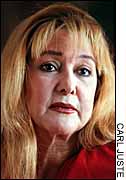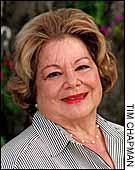|
|
Para ver este documento en español, oprima aquí.
The Miami Herald
George W. Bush Chipping Into Hispanic Vote, Poll Says
by JODI A. ENDA y MARK SILVA
June 30, 2000
Copyright © 2000 The Miami Herald. All Rights Reserved.
While most Hispanic voters trust Al Gore over George W. Bush on an array of issues, the Democratic Party's traditional support among the fastest-growing minority group is eroding, according to a Knight Ridder poll released today.
Gore, in the most comprehensive survey of the Hispanic electorate this year, holds a 16-point margin over his Republican rival. But the vice president's 50-34 point lead over the Texas governor falls far short of the Hispanic support that President Clinton claimed in his two elections. In 1992, Clinton prevailed over Bush's father among Hispanics by 62 to 25 percent.
However, within Florida, Bush's overwhelming support among Republican-leaning Cuban Americans -- who favor Bush over Gore by
|
|
|
|
|
|
|
|
|
|
|
|
|
|
 |
 |
|
|
LIKES GOP: Cuban-American Elisa Perdomo backs Bush. |
|
FOR GORE: Lee Medina, Colombian-American. |
|
|
|
|
|
|
|
75 to 12 percent in the survey -- is the foundation of a comfortable margin among Hispanic voters throughout the state and a slim lead over Gore among Floridians in general.
In fact, many voters surveyed say they intend to back Bush even though they have more confidence in Gore's ability to handle issues most important to them, such as education, health care and the economy. A sense of dismay with the Clinton administration -- and its relations with Cuba -- emerges from interviews with Florida voters.
``If I could go out and pick somebody, he wouldn't be my first pick,'' Dennis Valdez, a Miami Springs paramedic interviewed in the survey, says of Bush. ``But he beats, by far, the other guy. . . . Gore, putting aside anything about him personally, comes from the Clinton administration, and he is a product of all that.''
The Gore campaign takes heart in survey findings that Hispanics have more confidence in Gore to deal with a dozen issues they deem priorities.
The gap is greatest on the question of improving access to health care, with 56 percent of the poll's respondents saying they have more confidence in Gore and 27 percent having more trust in Bush. Addressing the issue on which voters rated Bush highest -- improving education -- they still said they prefer Gore by 51 percent to 33 percent. On both education and health care, more than 15 percent picked neither candidate.
This year, Hispanics are expected to vote in greater numbers than ever before, as a growing population and increased voter registration promise more than 5 percent of the vote cast in November. There were 31.7 million Hispanic Americans in March 1999, or 11.7 percent of the nation's population, according to the most recent Census Bureau reports.
The Knight Ridder poll of more than 2,700 registered Hispanic-American voters brings into focus one of the problems the vice president is wrestling with: defections by traditional Democrats.
``Gore needs to convince the Democrats who are defecting to Bush to come back to his camp,'' says T. Michael Alvarez, a political scientist at the California Institute of Technology who reviewed the survey's findings. ``He's got his work cut out for him.''
MOSTLY DEMOCRATS
Nearly 60 percent of ``likely'' Hispanic voters polled identified themselves as Democrats -- 10 percentage points more than those supporting or leaning toward Gore, according to the poll, conducted May 26 through June 15 by International Communications Research of Media, Pa., for Knight Ridder, The Herald's parent company. The survey's national results have a 1.9 percentage point margin of error.
Twenty percent of respondents say they are Republicans, considerably fewer than the 34 percent supporting or leaning toward Bush.
``Bush is a more appealing Republican to Hispanics than any Republican who's come down the pike,'' said Bruce Buchanan, a political scientist at the University of Texas at Austin. ``Bush is taking a definite step in the direction of making Republicans competitive.''
In 1996, President Clinton received 72 percent of the Hispanic vote, compared to 21 percent for Republican nominee Bob Dole and 7 percent for billionaire Ross Perot of the Reform Party.
In Florida, since President John F. Kennedy's much criticized handling of the Bay of Pigs invasion, fierce loyalty to Republican candidates for president has become a hallmark of South Florida's Cuban-American voters. Presidents Reagan and Bush claimed 80 percent or more of this vote when they ran.
CLINTON'S SUCCESS
Clinton was able to make inroads, capturing more than one-third of the Cuban-American vote -- and 42 percent of the overall Hispanic vote in Florida -- for his reelection in 1996, the first year that Florida voted Democratic in 20 years.
But the administration's handling of refugee Elián González has given Cuban-American exiles new reason to mistrust the Democrats.
``I don't like Democrats,'' says Elisa Perdomo, 70, a Miamian surveyed. A refugee from Cuba in 1964, she found renewed reason in Clinton's farewell to Elián this week. ``I always thought bad of them, and they proved me right. They proved that they would make an agreement with Castro to send [Elián] back to Cuba, and that is against my heart.''
Perdomo says Bush comes from good stock: ``I like his father. I think if he had any problems, he could go and ask him. . . . Parents sometimes influence children in a good way.''
Among Hispanic voters, however, there is no unanimity of sentiment on either Elián or the presidential election.
``Even to entertain keeping that child in this country, that made us kidnappers,'' says Colombia-born Lee Medina, of Miami Lakes.
Medina, an independent, says she will vote for Gore, but mainly as a matter of practicality -- she likes Ralph Nader, the Green Party's candidate, but doubts he has any chance of winning. Gore ``is a true Democrat to me,'' Medina says. ``He is very open-minded. He works for social issues, like women's choice'' on abortion.
Bush has been making a pointed effort to appeal to traditional Democratic voters, including women, African Americans and Hispanics. While he doesn't expect to win outright among minorities, he merely has to seize enough votes to whittle Gore's lead.
``That a Republican candidate should be getting almost a third of a minority community vote is a surprising turn of events,'' says Ross K. Baker, a political scientist at Rutgers University. ``George Bush doesn't have to win 30 percent of Latinos. He has to hold down Al Gore's margin among minorities.''
In Florida, Hispanic voters will account for as much as 12 percent of the vote -- with Cuban Americans nearly 8 percent of the state's five-million-plus voters.
In California, Hispanics are expected to comprise as much as 18 percent of the electorate in the most populous state. There, the survey shows Hispanic voters backing Gore by more than 2 to 1.
GROWING BLOC
``They're important because they're growing in size, they're important because they're identifiable,'' says Andy Kohut, director of the Pew Research Center. ``They're important for Democrats because Democrats have traditionally won a lion's share of the vote.''
Indeed, the Bush campaign revels in the governor's showing among a voting bloc that historically has favored Democrats. ``These are very encouraging numbers. This shows that Gov. Bush is a different kind of Republican,'' Bush spokesman Ari Fleischer says.
Bush has had considerable success winning Hispanic votes in Texas. One election-day poll in 1998 showed Bush winning reelection as governor with 49 percent of the Hispanic vote.
The Knight Ridder survey shows Gore holding only a narrow lead over Bush among Hispanic Texans -- 45 to 40 percent.
Gore's campaign is not conceding a large segment of the Hispanic vote.
``Al Gore intends to earn their trust,'' says Janet Murguia, deputy campaign manager for constituency outreach. ``Hispanics are more empowered today than at any other point in history. They will be thoughtful about who they choose.''
Edwin Garcia of the San Jose Mercury News and Ron Hutcheson of the Fort Worth Star-Telegram contributed to this report.
|

